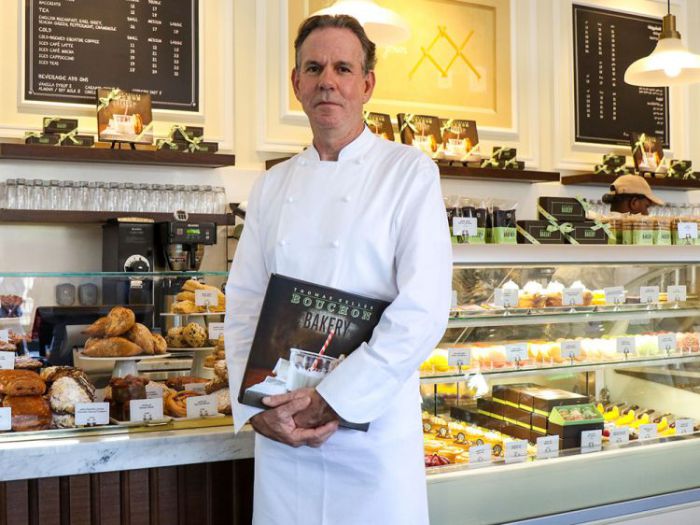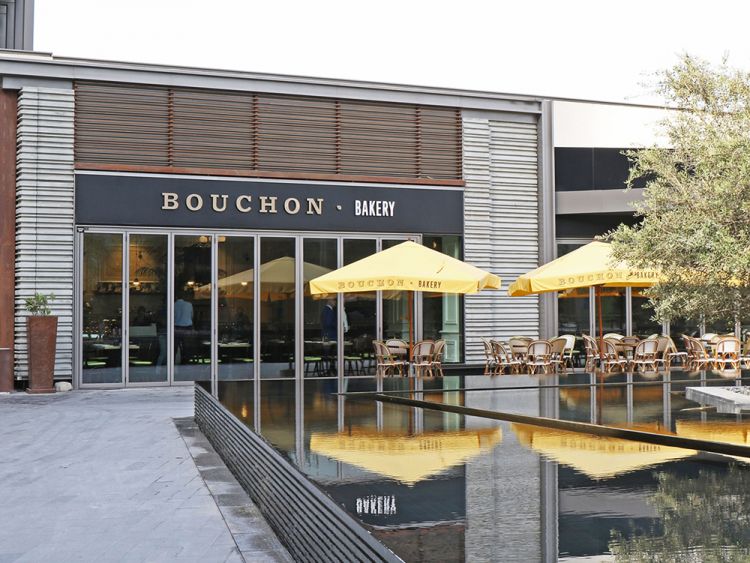 The American chef Thomas Keller is one of the very best on the planet and Vogue Manhad a long talk with him when he was in town to open his Bouchon Bakery.
The American chef Thomas Keller is one of the very best on the planet and Vogue Manhad a long talk with him when he was in town to open his Bouchon Bakery.
Here’s the entire conversation, in which he talks about his inner child, the joy of fast food, sustainability, justifying the price of food, why there’s nothing new, and why food isn’t the point of a restaurant.
Why did you choose Dubai to open your first overseas place?
Mohammed Alshaya. We’ve been offered things before elsewhere following The French Laundry getting a lot of recognition, but I didn’t really want to open up outside the United States because of my relationships with all the farmers, fishermen, gardeners, and so on. The produce in our restaurant is so important. So, to go somewhere else means finding all-new suppliers and in places like the UK, France, and Italy there are already great restaurants using those suppliers, so I’d have to get in line. Although I’m not sure if other chefs relate their success based on the ingredients they can get.
Mohammed wanted to do a branch of Bouchon Restaurant rather than the bakery, but when I started to analyze it, the bakery was much better because of the availability of ingredients. Bouchon’s inventory list is massive and 70% of it is fresh ingredients, so it would be a lot to source in an area where I don’t know anybody. But a bakery has a much smaller inventory list and most of them are commodities – flour, milk, eggs, sugar, cream. It makes much more sense from an operational point of view and from our ability to execute at a very high level. You can learn to deal with a different type of cream out here, but trying to find the right chicken could prove to be difficult.
How is Dubai viewed in America as a culinary destination?
It’s like Las Vegas. I have a place in Las Vegas and so do a lot of my colleagues and the food scene in Dubai is viewed the same way, where there’s a lot of well-known chefs coming here and planting a flag and doing good work, but it’s not their home.
Is it just a case of new openings following the money?
I came to Dubai 12 years ago and Gordon Ramsay was here and a few other well-known chefs. I just didn’t feel I was ready. But Dubai is Dubai. It’s very dynamic and full of energy, but unfortunately for me it’s 18 hours away.
You said this bakery is “food for the inner child,” so is this the yin to the yang of your restaurant Per Se?
Bouchon Bakery began as a need. We just wanted a bakery to make our own bread for the French Laundry and elevate our bread service. That way we could have three or four bakes a day, rather than getting bread delivered from outside once a day and that was made last night. At the same time, we wanted to give the local community in Yountville something, so we created a very small retail area and a courtyard where people gathered in the morning and had a cup of coffee and a croissant.

Bouchon Bakery, The Walk, Dubai
Where does the inner child part come from?
The inner child-ness comes from memories. When we are children, we have these experience around food, especially sweet things, and that resonates all our lives. In America, who hasn’t had chocolate chip cookies, right? When you eat a chocolate chip cookie you revert back to being a six-year-old. The other aspect is about history and tradition. In France, baguettes are extremely important to us and you have to get that just right. It actually takes a lot of effort to make a macaroon correctly and I think ours are extraordinary.
So is this about trying to make the best chocolate chip cookie you possible can, the best croissants, and so on?
I’m not sure about the best chocolate chip cookie but it’s a good one that’s crunchy on the outside and soft in the middle. Some prefer them crunchy all the way through, some prefer soft ones – depends if you grew up eating Chips Ahoy or Toll House brand cookies. There’s no right or wrong, but we use really good ingredients. Is it the best in the world? I have no idea, but I know I’m satisfied when I eat it. It doesn’t need to change your reference point on a chocolate chip cookie, it just needs to make you go, “Ahhh.”
I’d go to In-And-Out Burger at least once a month if it wasn’t for my diet
Do you still take pleasure in, for want of a better term, common foods? Do you get excited about finding a place that does a great chili dog or discovering an amazing new flavor of chips?
They’re most of the things I eat, so yeah. I cook refined food all day long and it’s not that I don’t go out to fine dining restaurants, it’s just when I eat, I usually don’t eat like that. I’m very simple – give me a beautiful roasted chicken and a salad and I’m happy. I’d go to In-And-Out Burger at least once a month if it wasn’t for my diet, so I don’t mind eating fast food.
I grew up in a middle-class family in America and going out to dinner was going to McDonald’s, so I still have those wonderful memories based around my family eating at McDonald’s. It helps elevate the quality of the meal because of the experience of that and the memory ingrained. I haven’t eaten a McDonald’s hamburger in years, but I’m sure if I did, it would probably fall back into the same feeling I had about McDonald’s hamburgers when I was 10 years old.
Does food go through real trends then, or is that just something that people perceive, but isn’t actually there?
I think trends are problematic because trends begin and end, so who wants to be part of that? And then you have to find something new and you’re always chasing something and often you’re not sure what that is. If it’s a movement, jump on board wholeheartedly, but if it’s just a trend then don’t.
Trends are problematic because trends begin and end, so who wants to be part of that?
But are they just media inventions or do they come from one or two chefs standing out for having done something new or taking restaurants in a new direction?
It’s a bit of both. If you look at our profession and its evolution, there have been milestones and benchmarks and it could be perceived as a trend, but the reason that it is perceived that way is because the media will always look for something new. There has to be a true understanding of what the historical value is. We all stand on the shoulders of those who came before us and they set the benchmarks and if it weren’t for them, we wouldn’t be here.
Paul Bocuse is the chef who decided that food should be put on a plate and most people don’t realize that – this was in 1968. Up until that point, all fine dining restaurants were presenting food tableside and it was plated in the dining room. But he said, “We’re chefs, we should plate our own food.” And for fine-dining restaurants that’s when the whole idea of a composition on a plate started. In my lifetime that’s happened, and it’s pretty extraordinary.
There’s constant change. Our profession is more and more recognized because young people are increasingly making it a career choice. This is happening around the world and every country is beginning to have great cuisine.
I was in Kuwait a few months ago with four young Kuwaiti nationals. One of them has her father making her go to law school, but she has no intention of practicing law. She has every intention of opening a restaurant because that’s what she loves doing. It was so refreshing and wonderful to see these young people actually starting a culinary culture in their country. That’s where we were 60 years ago and I applaud them for doing so.
Did your style of cooking change when your restaurant got its first Michelin star? Did getting a star have a knock-on effect as to how you go forward in terms of what you put on the menu?
Well, it’s more on your minds as the media than it is on mine. Every accolade and every recognition we receive is wonderful and I’m very proud of them but they’re for what we did yesterday. We’re worried about what we are doing tomorrow, and we know we can do better. It’s not that we think we’re not good enough, we just know we can do better. We are our own worst critics and we strive for betterment every day. I have to remind the team in all of our restaurants once in a while that they are doing a really good job.
Are you surprised if something doesn’t work on a menu?
No. But our menu changes every day so it never really gets to the point of a consensus of, “Oh, that didn’t work.” We decide on the composition the night before and we won’t plate it until the first time it’s plated for service that night. But really, we’re not an intellectual restaurant, we’re an emotional restaurant and we’re trying to touch people’s emotions.
Your emotions are so much more powerful than anything that speaks to your intellect
That’s the aim when you create a dish? An emotional reaction?
For me, your emotions are so much more powerful than anything that speaks to your intellect. There’s a lot of progressive food today where, if there’s a composition that you have never tasted before then you can’t say it’s good or bad, as you have no reference points. It would be presumptuous to say, “This is a good interpretation of this dish.” You’re just left with a simple question of whether you liked it or not, and if you didn’t like it then most likely you’ll never taste another composition made up of the same ingredients to get to the point where you can say if it was better than the last one.
There’ll never be a fixed reference point…
Right, because everybody is trying something so new, that’s never been done, with flavor combinations that have never been put together before… All you’re left with is, “Do I like it or not?”
Food as it is, is not the purpose of going to a restaurant. And I think we’ve lost the idea of that
But do you look back at the likes of Auguste Escoffier and latterly Guy Savoy and feel that you have to follow on from what they do and not stray too far into virgin territory?
Well, this is where some of my colleagues miss the point… We’re a restaurant where people come to experience many different things.
They want to experience each other, because the most important decision when going to a restaurant isn’t which restaurant you are going to, it’s who you are going with. A meal can be diminished by somebody at the table and it can ruin the experience – “I’m never going back there, I had a terrible time!” And it was all because some idiot at the table was bothering you. Or you can have an argument with your partner. There are lots of different things that impact the experience and the perception of the food. You can also go to a restaurant where the food is just amazing, but you have the worst service and you think, “I’m never going back there.”
Food as it is, is not the purpose of going to a restaurant. And I think we’ve lost the idea of that. We’ve made the food so important that we’ve lost the communication to the guest. It’s something I can respect people doing, but it’s really not something that I do.
We look back at reference points and make sure that we are touching the emotional side. At the same time, your experience is made up of many things, and wine is an important part for many people and I’m not going to tell you what wine – or beverage – to drink with which course because I’m not so presumptuous to claim that I know your taste well enough or that you might want this wine with this course. I never drink white wine with foie gras, but every time you go to a restaurant and they’re going to pair something with a foie gras, what are they going to give you?
A sweet wine…
Exactly! I like something that has acid as I have enough fat on my plate, I don’t need fat in my wine. I don’t do wine pairings as I want to make sure you have the ability to choose what you want to drink and yet I need to make sure that the wines and the food we have available for you are going to somehow work. If I’m going out for a steak then I already have in my mind a notion of what I want to drink with that steak. It may not be what the sommelier recommends, I may want to drink a Zinfandel that night and a sommelier would never ever, ever, recommend a Zinfandel for me.
But on the other hand, I’ll sometimes be in a restaurant and think, “You don’t need a wine list this big, this is a novel not a list.”
Ha, well that’s a whole other thing, I’ve been trying to change that for years – our wine list grows and grows every year. It seems to be this pissing contest where everybody competes with one another, “My wine list is bigger than your wine list” but in reality, we are encumbering the guest from having a good time by them having to review a wine list that has 3,000 bottles on it. But people in that kind of restaurant expect that, so I haven’t come up with an answer yet.
Sometimes simple is best. Sometimes you just want something really simple, but good, like a sandwich. Say tonight you’re making a sandwich – what would you make?
There’s nothing better than a BLT. Toasted, with crispy lettuce, good mayonnaise, beautiful succulent tomato. Can’t beat that. For me that’s the perfect sandwich. Or perhaps a turkey sandwich the day after Thanksgiving, but those two are simple sandwiches that I really enjoy.
If you want a vegan dish then no problem, who can’t cook vegetables? Why make someone feel awkward just because they are vegan?
So how do you go from that mindset to charging a lot of money for an eight or nine-course tasting menu? If a sandwich gives X amount of pleasure for little money, do you really have to do something special to justify high prices for food in your restaurant?
Expense of something relates to different things. You can’t associate expense with what the experience is. It comes with what the ingredients are. It’s like someone saying to me, “I made your pea soup last night and it wasn’t what I thought it was going to be,” well, yeah, it’s not what you thought it was going to be because you can’t get the peas that I can get.
The relationships we have with farmers and fishermen and so on is so, so important. We have to be able to support them in ways that other people can’t support them and that’s what good chefs do – they work with farmers and fishermen and the like to get the ingredients that they want.
So, when you go to a restaurant, what are you paying for? You’re paying for the knowledge, expertise, and skills of every staff member and what we call the “casual luxury.” You’re surrounded with luxury but you feel very casual about it because there’s no pretense and that’s important. We have no pretense, we have no ego, we’re there for you.
If you want a vegan dish then no problem, who can’t cook vegetables? It’s the easiest thing in the world so why would you say no to something like that? Why make someone feel awkward just because they are vegan? The better the restaurant, the more they should be there for you. It was the reverse for a long time and the better the restaurant, the less likely it was that you would get what you wanted, but we’ve now reversed that.
If you think about the expense of anything then I’m not sure why restaurants are being pigeonholed as being expensive. Try to get a ticket to Hamilton on Broadway and it’s going to be $1,000 but for an hour and a half you have a really great time. Spend $1,000 in a restaurant and you’ll have an amazing time too.
I don’t know why we continually try to hold restaurants to a different standard than everybody else…
Is it not simply the perception that you can’t go and see a musical in your home, but you can cook at home, albeit probably not of the same standard?
Well, Masa Takayama, one of the best sushi chefs in the world, opened a restaurant in New York near Per Se and I was walking to Per Se one day and there was this guy stood outside there and said to me, “Is this that restaurant Masa? This is the place that charges $500 for sushi?” and I said yes, and he replied, “Why would I pay $500 for sushi when I can go down to Whole Foods and get it for $9?” And that’s the basic problem, right? He didn’t understand the skill and knowledge and time and where the product comes from and he just doesn’t get it, so he’ll never appreciate Masa.
We have to be able to elevate ourselves, whether it’s art, music, or fashion because the top tier of expertise always influences everything else below it
We have to be able to elevate ourselves, whether it’s art, music, or fashion because the top tier of expertise always influences everything else below it. And if you lose that expertise then everything else starts to fail below it.
Where are we all headed with restaurants now? Is there a direction that we’re going in? Sustainability was mentioned by a lot of chefs I’ve spoken to in the last few years but it seems to have gone a bit quiet recently.
But what is sustainability?
Well, in Dubai, for example, places have largely stopped serving the fish Hamour because it was being overfished…
Sure, you can’t be overfishing or factory farming. But people complain about me bringing in lobsters from Maine on an airplane because of the carbon footprint, but that’s just nonsense. Study factory farming. Transporting food is a tiny proportion but factory farming is huge and nobody really knows about that stuff because they won’t let you near it. There have been a few articles, books, and documentaries about it but it hasn’t really changed anything significantly and that’s where we have a huge carbon footprint. It’s not me putting 24 lobsters in the bottom of an airplane that you’re sitting up above and paying $300 on a ticket and I’m paying $100 for the lobsters.
And the idea of local – what is local? Define local. Most people would use some geographical reference but what is it? A 25-mile radius? 100 miles? I have no idea.
The world’s local for Dubai; pretty much everything is flown in.
That’s my point. People in a lecture or conference will say you can’t buy something that is more than 50 miles away. But you drink a cup of coffee and the beans were grown in South America, the sugar is probably beet sugar from up in Montana, don’t talk to me about local!
We need to be supporting the individuals who raise our food regardless of where they’re from
But at the same time, if there’s a farmer growing a carrot within a 50-mile radius, he didn’t give sh*t about how he grew the carrot, didn’t care about the carrot, the property, the land, or the customer or anything and it’s a sh*tty carrot, do I have to buy the carrot just because it was local? But if someone 51 miles away grew the most amazing carrot and cared for the land but I wasn’t able to buy it then he goes out of business. Who are we meant to be supporting? We need to be supporting the individuals who raise our food regardless of where they’re from.
Then there’s the whole political spectrum. Should I be buying Iranian caviar? Or should you be buying it in a restaurant? It’s a fisherman who makes his livelihood out of it. I understand the political things going on between Iran and America but at the end of the day, I’m a person and he’s a person and we’re not political. If I want to eat his excellent caviar, there’s nothing wrong with that.
I shouldn’t have to take something off my menu because some idiots out there are overfishing; that’s their job
Communities are sustainable too and you need to think about that. I buy my lobsters from Stonington Lobster on Deer Island in Maine and they’re part of a little community with farmers, teachers, firemen, and so on, and if they had to sell their produce locally then Stonington Lobster would not be there. Those fishermen understand that and they value their ability to manage their fishing to ensure it’s all sustainable. I shouldn’t have to worry about sustainability. The people chefs buy from are the ones who should be concerned about sustainability. I shouldn’t have to take something off my menu because some idiots out there are overfishing; that’s their job. If I have to control sustainability out of our oceans then what the hell’s everybody else doing?
Where do you see your menus headed in future? Are you constantly trying to come up with something new?
There is nothing new. What’s new?
Ferran Adrià did some new things and I’m sure if you go to Heston Blumenthal’s restaurant The Fat Duck you’ll find something you haven’t eaten elsewhere
Sure, I know Heston but that’s not new, it’s just a reinterpretation of what’s old. Heston finds his influence in history, sometimes in books, sometimes in fairy tales. His consommé, for example – you pour hot water on the coin and it becomes this beautiful consommé – but bouillon cubes have been around for decades, he’s just repackaged it. I love Heston, he’s very clever and one of my best friends and his restaurant in terms of progressive cuisine is probably the one I appreciate the most. But it’s not that progressive when you think about it, it’s just being clever about the way you serve things.
And then Ferran Adrià became famous for what? Foam?
Mostly…
Right, do people really think that was new? I mean for cripes’ sake, how many times have you had a cappuccino? There’s been foam on cappuccinos for generations. You’re influenced and inspired by things that you see, but it doesn’t make it new and that really needs to be understood. There’s nothing that I do that’s new. What we do is try to be influenced and look for inspiration, but inspiration only happens very rarely in your life. How many times have you been truly inspired? I think I’ve been inspired only three or four times in my whole life.
Ferran Adrià became famous for what? Foam? Do people really think that was new? How many times have you had a cappuccino?
So you’re just part of a long linage and are carrying it on?
You have to be aware of what’s around you in order to be inspired and it’s OK, I don’t think anybody truly creates anything, that’s left to whatever you believe in and however the world got here, because there’s nothing new and everything that’s here has always been here…
You just repackage it…
Right, and different ways of manipulating it and that’s fine. But it’s food, what new food’s out there? Sure, you can cross a tangerine with a lemon and create a hybrid, but not as far as new food.
Finally, would you weigh in on a debate about whether baked beans have a place in a fry-up?
Oh, I look forward to eating breakfast in the UK and having a fry-up partly because of baked beans. In America we grew up on baked beans and going back to what we were talking about earlier, it’s a reference point to things you’re familiar with. Beans in a fry-up? Fine with me, but it’s one of the genuine things that I think is unique to the UK. There’s a certain amount of affection for something like that and there’s a tradition and history there. I like that kind of stuff.
For Vogue Man – original article here.
Share this:




